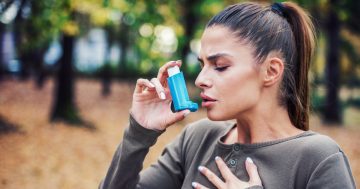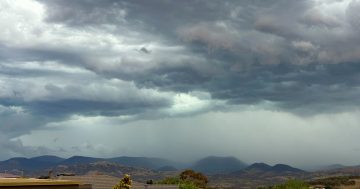
Jessica Sewell and clinical nurse consultant Sistine Anne Ramaio Aredidon go over their asthma plans. Photo: Jarryd Rowley.
The Thunderstorm Asthma Collaborative (TAC) has launched its annual spring asthma awareness campaign to alert local residents about the potential dangers of the hay fever season.
With several severe thunderstorms expected for the remainder of the year, the TAC is reminding families to have their asthma plans ready and to be alert in the case of an electrical storm.
Murrumbidgee Local Health District Disaster Manager Denise Garner said due to high pollen counts from plants such as ryegrass, thunderstorms were able to break the pollen into even smaller particles that could be inhaled into people’s lungs.
“It’s not just known asthmatics who are at risk, but also people that have hay fever,” she said.
“If you’re new to the area or travelling through the region make sure you see your GP and check if you suffer from asthma or hay fever so you can put a plan in place.”
Ms Garner said not all thunderstorms would cause problems this spring, but people should remain vigilant regardless.
“It’s really a judgment of checking out what the pollen counts are and looking at the storm activity and just giving people that warning of be prepared, stay indoors during the storm and those kinds of messages,” she said.
“It’s really a specific time period. It’s basically two weeks on either side of the Melbourne Cup, we (MLHD and Primary Health Network) increase our stocks of asthma supplies, educate our staff about this season, and then look at the pollen counts and put out alerts when we need to.”
Jessica Sewell only discovered she suffered from asthma when she moved to the region less than two years ago and is reminding people it is never too late to check if they are vulnerable to asthma and hay fever.
“I previously lived in Sydney and Canberra where I had some mild symptoms, but it wasn’t until I moved to Wagga Wagga that it became a lot more severe,” she said.
“I have an unusual type of asthma, also known as an atypical type of asthma, called cough variant asthma which is why they took a very long time for both me and my doctors to pick up”
“I used to enjoy thunderstorms. Now I don’t as much because I start to feel a little bit concerned. I’m thinking, ‘OK, what’s going to happen?’
“So I get my puffers; make sure I’ve always got them on me; make sure they’re always primed, clean, ready to go. And I never go outdoors without them. If I’m inside, which I try to be, if I know a thunderstorm is coming, then I’ll close the windows and doors.
“I used to think that asthma couldn’t hurt anyone; I learned very quickly that it can come on really suddenly. It’s important that people are prepared for the worst and take this time of year seriously.”










